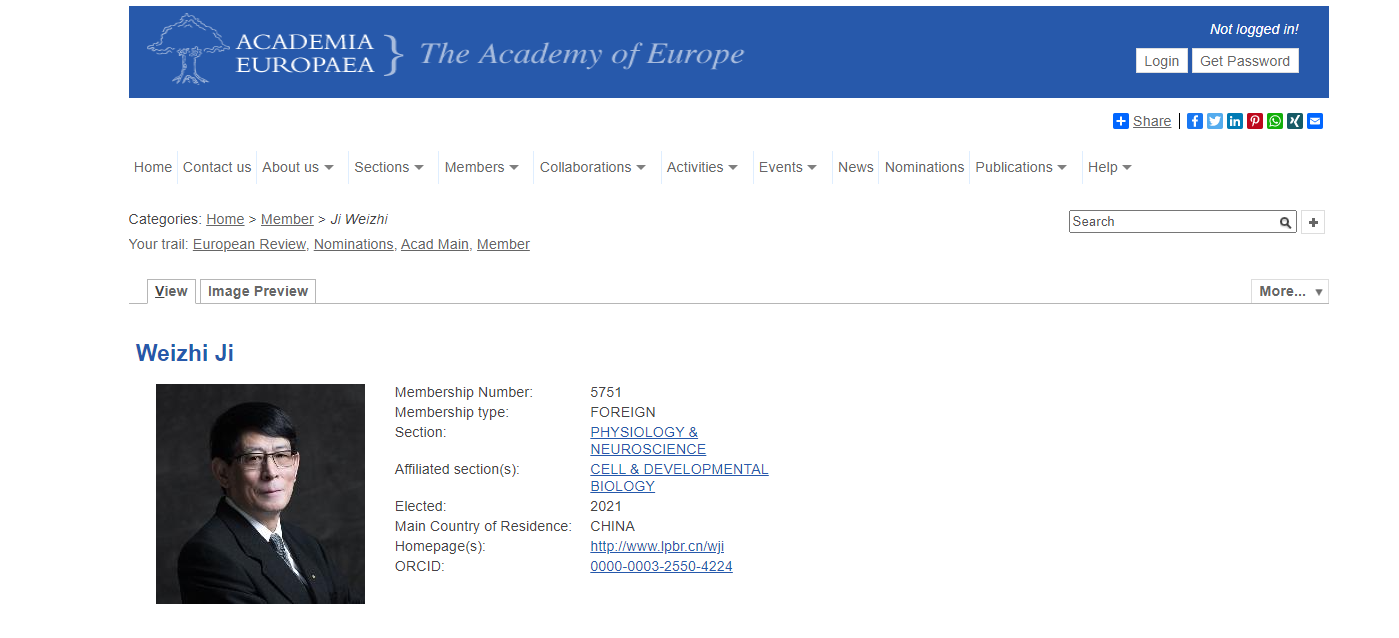Ji Weizhi, Distinguished Professor of KUST, has been elected as a foreign member of the Academy of Europe, as seen on the list of new members in 2021. Professor Ji Weizhi is a member of the Chinese Academy of Sciences and Director of the State Key Laboratory of Nonhuman Primate Biomedicine of KUST.

JI Weizhi’s personal information published by the official website of the Academy of Europe Headquartered in London, UK, the Academy of Europe (Academia Europaea) is an international scientific organizationfoundedin1988 at the call of the European Ministers of Science. It wasco-founded by a number of national academies of science representing the highest academic level in Europe, including the Royal Society. Members of the Academy of Europe mainly come from European countries. It represents the highest scientific level and academic status of the humanities and natural sciences in Europe. At present, there are about 4,500 members of the Academy, including 74 Nobel Prize winners, 7 Turing Award winners, and 15 FieldsMedal winners.
At present, JI Weizhi holdsthe titles and positions as follows:
Member of the Chinese Academy of Sciences
Distinguished Professor of KUST
Dean of the Institute of Primate Translational Medicine
Director of the State Key Laboratory of Non-Human Primate Biomedical Research
Chairman of the Yunnan Provincial Key Animals Laboratory of Primate Biomedical Research
Director of the National Joint Local Engineering Research Center for Biomedical Animal Models.
Director of the Global Future Council on the World Economic Forum (2016-2018)
Expert of the National Stem Cell Research Steering and Coordinating Committee
Member of the expert group of the National Major Scientific Research Program on Reproduction and Development (2006-2014)
Member of the expert group of the National Committee for Experimental Animal Research
Chief scientist of the 973 Project
Director of the Chinese Society of Cell Biology
President of the Stem Cell Biology Branch (2019-2022).
JI Weizhi has long been involved in primate research. Hehasconducted studies on the scientific issues such as regulation of early primate embryonic development, stem cell pluripotency and monkey models of human disease and pathogenesis. He also has developed systematic research systems of in vitro fertilization, early embryonic development, gene editing and stem cells. JI has made new findings while pioneering studies on the molecular mechanisms of primate reproduction and development, self-renewal and differentiation regulation of stem cells. He has published more than 100 SCI papersascorresponding or firstauthorin Cell, Nature, Science, Cell Stem Cell, PNAS and other journals. His work on primate gene editing has been evaluated as a milestone in the establishment of human disease models. This work was selected as one of the top 10 technological advances in the world in 2014 (MIT), the best paper in Cell in 2014 (Cell), and one of the top 8 most successful events in the world in 2014 (Nature). JI has actively promoted the coordination and innovation of primate research in China. He initiated the establishment of theChinese Primate Biomedical Research Alliance. The Alliance hasunited the strengths of primate research in China, which haspromoted the original discovery of basic theories in life science and the industrialization of primate biomedicine in China,while contributing to human health and maintaining international leadership in related fields in China.
The Website link of the Academy of Europe: https://www.ae-info.org/ae/Member/Ji_Weizhi
Translated by: YANG Fuyu, Faculty of Foreign Languages and Cultures
Edited by: DUAN Tianting, Faculty of Foreign Languages and Cultures (English)
Source: Institute of Primate Translational Medicine
Issued by: Division ofInternational Cooperation (English)
Edited by: KUST News Center (Chinese)